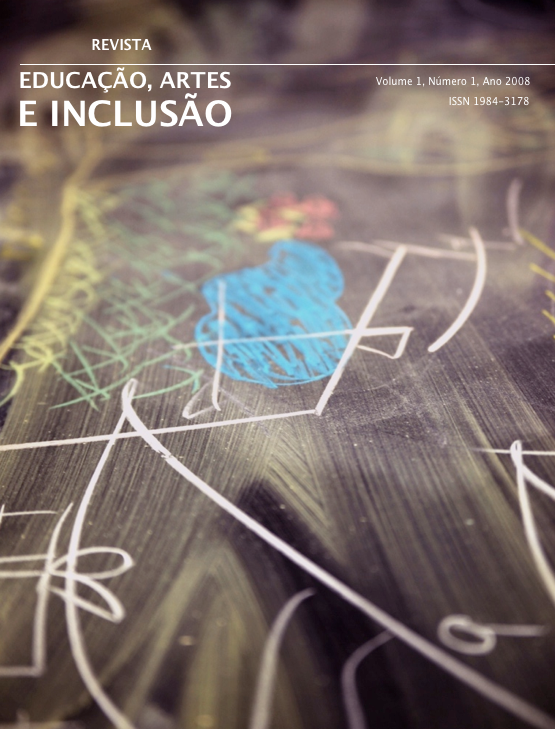A RELAÇÃO ESCOLA, TECNOLOGIA, ENSINAR E APRENDER: A TEORIA CRÍTICA COMO SUPORTE DE ANÁLISE
Abstract
O presente texto discorre sobre parte das discussões teóricas que fundamentam pesquisa de mestrado ainda em desenvolvimento. Nos limites aqui impostos, objetivamos apresentar algumas notas sobre a temática do currículo, elegendo a teoria crítica, mais especificamente, a sociologia crítica do currículo como “o lugar” de onde pretendemos buscar as contribuições para o debate sobre a relação entre a escola, a tecnologia e o currículo. Tomamos essa relação determinados pela hipótese de que o uso do computador no ambiente escolar influencia as ações do/no cotidiano, atuando diretamente nas atividades, nas práticas, nos discursos, nos modos de ensinar e de aprender. Diante disso, partimos do pressuposto que o currículo também é uma construção da/na cultura escolar que se reinventa diante da inserção da tecnologia no cotidiano da escola. Essa reinvenção está no desenho das novas formas de se conduzir o processo de ensinar e de aprender que se refletem no desenvolvimento de novas dinâmicas, uma vez que ocorrem relações sociais, troca de informações e aprendizados que são mediados pelo uso do computador. Nessa perspectiva, esperamos contribuir para o debate sobre currículo, discutindo a inserção dos recursos tecnológicos no ambiente escolar como parte do currículo da escola para atender a sociedade do conhecimento.
Palavras-Chave: Currículo, Cultura Escolar, Tecnologia, Informática.
Abstract: Relationship between school, technology, teaching and learning: critical theory foregrounding analysis. Current analysis deals with theoretical discussions that foreground a still undergoing research for a Master’s degree. Aspects on the curriculum thematics are presented, coupled to a critical sociology of the curriculum that will form the basis within the debate on the relationship between school, technology and the curriculum. A hypothesis is constructed on the use of the computer in the school milieu and its influence on the daily and day-to-day activities. It further analyzes the computer’s influence on the school’s activities, practices, discourses and its teaching and learning modes. The supposition is that the curriculum is also a construction of and within school culture that reinvents itself through the insertion of technology in the school’s daily activities. Reinvention lies within the new modes in the teaching and learning process that reflect themselves in the development of new dynamics. This occurs because of exchange in information and trainings mediated by computer use. Debate on the curriculum with discussions on the insertions of technological resources in the school milieu as part of the school curriculum to attend knowledge society will be thus highlighted.
Key-Words: Key words: Curriculum; School Culture; Technology; Computer Science.
Downloads
Downloads
Published
How to Cite
Issue
Section
License
Copyright Statement
The Educação, Artes e Inclusão is a journal that follows the Free Access Policy. The articles published by the journal are free of charge, intended for educational and non-commercial applications. The articles whose authors are identified represent the expression from the point of view of their authors and not the official position of the Educação, Artes e Inclusão Journal or the Educação, Artes e Inclusão Research Group.
Authors who publish in this journal agree to the following terms:
(A) Authors retain the copyright and grant the journal the right of first publication, with the work simultaneously licensed under the Creative Commons Attribution License which allows the sharing of the work with acknowledgment of authorship and initial publication in this magazine.
(B) Authors are authorized to take additional contracts separately, for non-exclusive distribution of the version of the work published in this journal (eg publish in institutional repository or as a book chapter), with acknowledgment of authorship and initial publication in this magazine.
(C) This journal provides public access to all of its content, as this allows for greater visibility and scope of published articles and reviews. For more information on this approach, visit the Public Knowledge Project.
This journal is licensed under a Creative Commons Attribution-NonCommercial-ShareAlike 4.0 International License. This license allows others to remix, adapt and create from your work for non-commercial purposes, and although new work must give you due credit and cannot be used for business purposes, users do not have to license such derivative works under the same terms.



